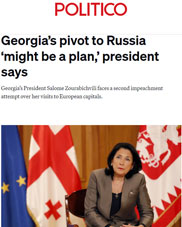The News in Brief
Friday, October 18, 2024
Prepared by Messenger Staff
Georgian President Raises Concerns Over Ruling Party's Alleged Moscow Ties
 In a recent interview with POLITICO, Georgian President Salome Zourabichvili expressed her concerns regarding the ruling party's connections to Russia, particularly focusing on the influence of Bidzina Ivanishvili. While she emphasized that she does not subscribe to conspiracy theories, Zourabichvili noted a troubling shift in the Georgian Dream party's trajectory away from its European aspirations.
In a recent interview with POLITICO, Georgian President Salome Zourabichvili expressed her concerns regarding the ruling party's connections to Russia, particularly focusing on the influence of Bidzina Ivanishvili. While she emphasized that she does not subscribe to conspiracy theories, Zourabichvili noted a troubling shift in the Georgian Dream party's trajectory away from its European aspirations.
"I do not have a logical, rational explanation for the Georgian Dream's deviation from the European path," she stated, highlighting the historical risks posed by Russia. "The main risk for Georgia comes from Russia. The risk of war increases when Georgia is isolated from its partners, when it's alone, divided, and weak," she added.
The upcoming parliamentary elections, scheduled for October 26, are described by Zourabichvili as "existential" for the nation. She warned that even if the ruling party secures a victory, restoring relations with Western allies, including the EU and the U.S., will be challenging due to ongoing tensions and attacks against these partners.
Zourabichvili expressed uncertainty about the ruling party's future actions, questioning whether they would pursue their radical agenda, which includes the possibility of banning opposition parties, or seek to mend ties with the European Union.
Civil Society Takes Fight Against Foreign Agents Law to European Court of Human Rights
 On October 17, a coalition of media outlets, civil society groups, and individuals announced their decision to escalate their legal battle against Georgia's "Foreign Agents" Law to the European Court of Human Rights (ECHR). This move follows the Constitutional Court of Georgia's refusal to temporarily suspend the controversial law.
On October 17, a coalition of media outlets, civil society groups, and individuals announced their decision to escalate their legal battle against Georgia's "Foreign Agents" Law to the European Court of Human Rights (ECHR). This move follows the Constitutional Court of Georgia's refusal to temporarily suspend the controversial law.
Nona Kurdovanidze, Director of the Georgian Young Lawyers' Association (GYLA), confirmed during a briefing that 16 media organizations, 120 civil society groups, and four individuals will file a joint complaint. "The Russian law is designed to suppress civil society and the media, while also creating division and silencing dissenting voices," Kurdovanidze stated.
She emphasized that the organizations involved in the lawsuit are committed to key social issues, such as environmental protection, judicial reform, disability rights, and fighting corruption, all of which are threatened by the law. The complaint to the ECHR will argue that several fundamental rights have been violated, including the right to freedom of assembly, expression, and privacy, as well as protection from discrimination.
Georgian President Raises Concerns Over Ruling Party's Alleged Moscow Ties

"I do not have a logical, rational explanation for the Georgian Dream's deviation from the European path," she stated, highlighting the historical risks posed by Russia. "The main risk for Georgia comes from Russia. The risk of war increases when Georgia is isolated from its partners, when it's alone, divided, and weak," she added.
The upcoming parliamentary elections, scheduled for October 26, are described by Zourabichvili as "existential" for the nation. She warned that even if the ruling party secures a victory, restoring relations with Western allies, including the EU and the U.S., will be challenging due to ongoing tensions and attacks against these partners.
Zourabichvili expressed uncertainty about the ruling party's future actions, questioning whether they would pursue their radical agenda, which includes the possibility of banning opposition parties, or seek to mend ties with the European Union.
Civil Society Takes Fight Against Foreign Agents Law to European Court of Human Rights

Nona Kurdovanidze, Director of the Georgian Young Lawyers' Association (GYLA), confirmed during a briefing that 16 media organizations, 120 civil society groups, and four individuals will file a joint complaint. "The Russian law is designed to suppress civil society and the media, while also creating division and silencing dissenting voices," Kurdovanidze stated.
She emphasized that the organizations involved in the lawsuit are committed to key social issues, such as environmental protection, judicial reform, disability rights, and fighting corruption, all of which are threatened by the law. The complaint to the ECHR will argue that several fundamental rights have been violated, including the right to freedom of assembly, expression, and privacy, as well as protection from discrimination.
